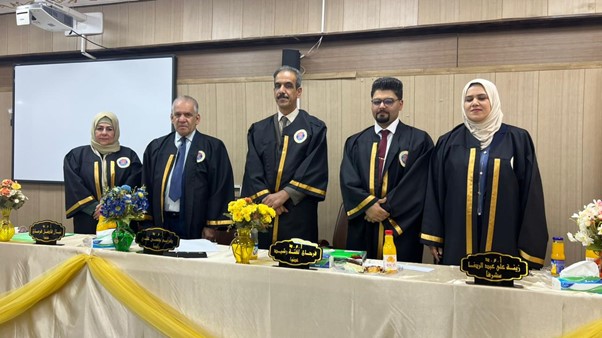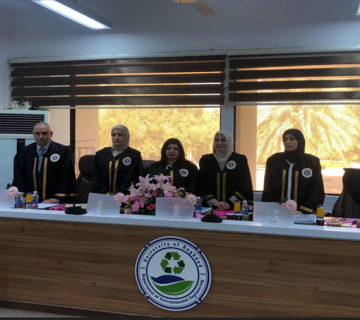The Master’s thesis submitted by the student Mohammed Jassim Talib in the Department of Energy Engineering was discussed on May 20, 2025, titled:
“Enhancing the Efficiency of solar-Powered Integrated Water Heating and Distiller Systems”
The thesis aimed to improve the efficiency of water heating and distillation systems using solar energy by evaluating the performance of two types of solar stills: one equipped with a wick and the other without a wick, and analyzing the impact of various design and operational factors.
The study included both theoretical and experimental analysis of the performance of two solar distillation systems integrated with an evacuated tube solar collector in Diyala Governorate. The stills were designed and oriented to the south at a tilt angle of 33.61 degrees. Experiments were conducted during the months of July, August, and September 2024 to measure the impact of solar radiation and ambient temperature on the systems’ efficiency and productivity.
The incident solar radiation on the inclined glass surface was theoretically analyzed, and thermodynamic equations (first and second laws) were used to calculate theoretical performance in terms of water productivity, efficiency, and temperature levels.
The results showed that the wick-equipped system achieved higher performance, with an improvement in productivity of 5% and 6% on July 20 and August 2, respectively. This improvement was attributed to the wick’s ability to distribute water evenly and maintain distillation even after sunset.
The study concluded with a set of recommendations to enhance the efficiency of such systems, most notably:
Using synthetic sponge wicks or metal meshes (aluminum or copper).
Applying nanotechnology to coat the inner surfaces of the distillation unit with nanoparticles.
Improving the water supply system by ensuring equal pressure distribution.
Enhancing smart monitoring and control through sensors for temperature and humidity measurements.
This thesis represents an important step toward developing solar-powered water desalination technologies, particularly under local climatic conditions, and opens the door for broader applications in the field of sustainable energy.








